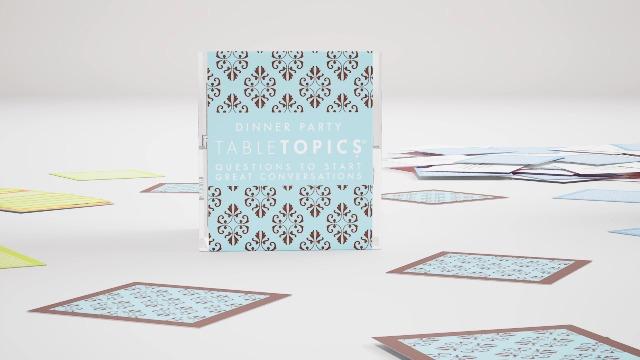Name: TableTopics (we played the Dinner Party edition).
Creator: Cristy Clarke
Platform: Cards
Target Audience: 12+
Introduction
I played the Dinner Party edition of TableTopics. At first, I hesitated to call this card-based “game” a game. It is certainly not a game in the traditional sense: there are no rules, no explicit winner or loser, and the only mechanic is the deck of cards. However, TableTopics leaves players with a sense of fellowship and fun because of the lack of direction: players can make TableTopics be whatever they want it to be.
I thought TableTopics would be useful because of what this game tries to achieve: deepening relationships and sparking new insights. Our card-based game, Worrywrecker, also aims to create a sense of fellowship and honesty by having players address their worries together. Each person reads a card to the group and must then decide together how to ease the worry. Worrywrecker introduces different levels of “card intimacy” to develop trust as the game evolves. In the first round, players only select the lowest-level cards, which contain more comedic and lighthearted prompts. The card level increases in subsequent rounds and prompts become more intimate. Just like TableTopics, there are no explicit “winners” or “losers”. Instead, players should achieve a sense of connection, achievement, and discovery.
Analysis
At first glance, TableTopics and Worrywrecker appear very similar. Both use card-prompted conversations to deepen the relationships of similar audiences. However, since Worrywrecker has an additional goal of giving players the skills to tackle problems in their real lives, the mechanics, dynamics, and aesthetics of the games must diverge.
Since TableTopics deepens relationships through prompted/vaguely directed conversation, it doesn’t require rules other than having players use the cards. When I first played this game with my boyfriend, initially it was unclear what we should do. How long do we spend on each card? Does each person answer the same prompt? The direction and pacing of the conversation were left entirely up to us. We ended up talking naturally, using the prompts as conversation starters. There were times when our conversation diverged from the original prompt. Since there weren’t clear boundaries between Tabletopics and non-TableTopics conversations, the magic circle of TableTopics felt blurred. Moreover, because I know my partner fairly well, there weren’t any shocking revelations. However, we still experienced fellowship through fun, lighthearted conversations about dream vacations and goggles (his response for the rightmost card).

The lack of structure and rules in TableTopics allows players to create their own game experience. Worrywrecker has a specific game experience in mind of players working together to solve problems. Therefore, it needs more mechanics and to structure relationships between players differently.
In TableTopics, everyone is of equal standing. In Worrywrecker, the cardholder has a different role from the rest of the group. By sharing their worries, they hold more power as the discussion leader. We haven’t decided on the dynamic we want for the rest of the group, such as if they are working together or competing amongst themselves to come up with the best solution. Regardless of the remaining group dynamics, the goals of the game necessitate there be one player whose worries lead the group discussion while every other player learns how to approach new problems.
Conclusion
Playing TableTopics was an enjoyable experience, but it is not the player experience we envision for Worrywrecker. Worrywrecker has a more specific player experience it wants to invoke, which requires more concrete boundaries and mechanics. We want players to come up with solutions to real worries. Hopefully, some of these solutions can help them in real life. At the very least, players can face their gamified worries and understand they have the tools to defeat them.




